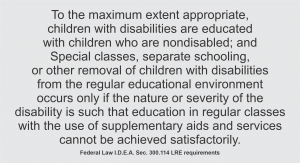What is I.D.E.A.?
I.D.E.A., Individuals with Disabilities Education Act also known as P.L.108-446 is a Federal program that provides funds to states and local education agencies (school districts) to support education for children with disabilities age 3 to 21, this is part B and Part C provides funds for states to support Early Intervention services for children birth to age 3.
 What I.D.E.A. does is provide guidelines and protections for children to assure their right to a free and appropriate public education (F.A.P.E.). The principle of the law is that children with disabilities should not be denied the same opportunities offered to everyone else, everyone gets access to public education and therefore so should children with disabilities.
What I.D.E.A. does is provide guidelines and protections for children to assure their right to a free and appropriate public education (F.A.P.E.). The principle of the law is that children with disabilities should not be denied the same opportunities offered to everyone else, everyone gets access to public education and therefore so should children with disabilities.
When a child meets the disability requirements of the law, and who by reason thereof needs special education and related services, the school districts are obligated to prepare and implement an Individualized Education Program (IEP) designed to meet the unique needs of the child. Identifying students in need of special education and related services is also a requirement of the law. Special education is a service and includes related services a child may need to achieve their individual goals (regardless if the child’s placement is in the regular class or a self-contained class). The school district remains responsible for providing the student with the supports and services they need without exception.
Links to IDEA information and resources
-
-
The U.S. Department of Education’s Individuals with Disabilities Education Act (IDEA)
Brings together IDEA information and resources from the Department and grantees.
-
-
-
The 13 disability categories under IDEA
The Individuals with Disabilities Education Act (IDEA) requires public schools to provide special education services to eligible students.IDEA covers 13 disability categories. Not every student who struggles in school qualifies.
-
